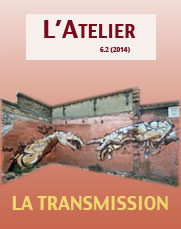Beloved de Toni Morrison : l’écriture aux limites du transmissible
Résumé
Avec son roman Beloved, Toni Morrison a choisi de rompre avec un certain héritage des lettres américaines, marqué par le discours blanc, parce qu’il écrase d’autres voix qui demandent à être entendues. Beloved est un roman qui cherche à transmettre la part maudite de l’histoire afro-américaine, interrogeant au passage la tradition paternaliste qui vise la seule reproduction des structures sociales qui la soutiennent. La référence à l’esclavage des Noirs n’est plus masquée, l’arrachement subi par les populations africaines pour être exploitées aux Etats-Unis n’est plus éludé. Il s’agit dès lors de transmettre un savoir sur l’indicible, l’horreur, l’inhumain sur lesquels repose l’imposture d’une civilisation supposée exemplaire. C’est à la parole refusée qu’une place doit être faite, et notamment à celle d’une mère qui a préféré interrompre le fil d’une forme de transmission établie en mettant à mort sa fille destinée à la condition d’esclave. L’exploration du traumatisme de Sethe étant impossible, Toni Morrison opte pour le recours au registre du fantastique et fait revenir d’entre les morts l’enfant qui n’a pu exprimer son point de vue. La transmission se révèle dès lors progressivement doublée d’une part d’invention, qui, articulée au manque qui fonde le désir, détourne du pire. A partir de là, le roman parvient à une véritable subversion des codes, témoignant de ce que toute passation du savoir s’obtient à partir d’un réel avec lequel le sujet n’a de cesse de se séparer.
With her novel Beloved, Toni Morrison chose to break with the legacy of the American literary institution because it was influenced by the views of the Whites and because it kept crushing new voices that demanded to be heard. Beloved is a novel which attempts to transmit the shameful part of the African-American history and which questions the paternalistic tradition that aims at the reproduction of inadequate social structures. The reference to Black slavery is not veiled anymore. On the contrary, the text shows how the African population was wrenched from their country in order to be exploited in the United States. The novel cannot therefore but express the unspeakable, the horror, the inhumanity that found a so-called exemplary civilisation. It offers a breach onto the words that keep being suppressed, in particular those of a mother who decided to kill her daughter so that she should not become a slave too. Yet, as Sethe’s trauma cannot be explored fully, Toni Morrison chooses to use the fantastic mode of writing and calls back to life the child who was not able to present her position. Thus, transmission and invention not only become indissociable but prevent the worst because they are supported by the basis of desire, i.e. lack. The novel is therefore strongly subversive: it demonstrates that experience can be passed on if the subject keeps separating from the unbearable.
-
L’envoi spontané d’un article à la rédaction de L’Atelier implique l’autorisation de publication et la cession des droits dans les limites établies par la loi de propriété intellectuelle.
-
L’Atelier conserve les droits de reproduction des articles publiés, quelque soit le support : internet, CD ROM, réimpression, photocopie, etc.
-
L’auteur conserve le droit de publier ultérieurement son article déjà paru dans L’Atelier avec la seule obligation de mentionner le nom de la revue comme source de la première publication.





